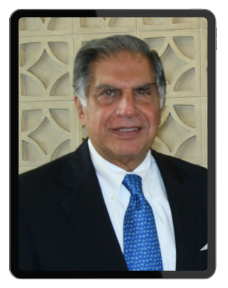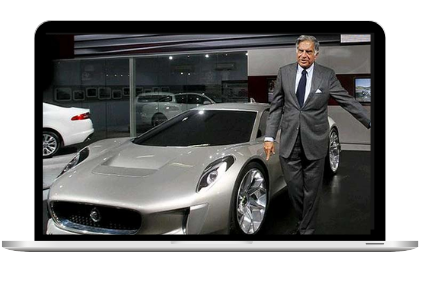Ratan Tata – A prominent business tycoon, philanthropist and a luminary figure whose success story is a inspiration for generations. Tata Group is India’s reputed multinational conglomerate founded in the year 1868. Its headquarters is in Mumbai and operates in various sectors such as automotive, steel, information technology, telecommunications etc. Mr. Ratan Tata was a chairman of Tata Group from the year 1990 to 2012 and interim chairman from October 2016 to February 2017. Mr. Ratan Tata is the man with visions right from the beginning of his career and his extra-ordinary skills has inspired generations across the World.
“Apart from values and ethics which I have tried to live by, the legacy I would like to leave behind is a very simple one – that I have always stood up for what I consider to be the right thing, and I have tried to be as fair and equitable as I could be.” – Mr. Ratan Tata
Let us understand the Success Journey in detail.
Who is Mr. Ratan Tata??
Mr. Ratan Naval Tata is the son of Naval Tata who was adopted by Ratanji Tata son of Jamsetji Tata, the founder of the Tata Group. He graduated from the Cornell University College of Architecture with the bachelor’s degree in architecture. He joined Tata in 1961 where he worked on the shop floor of Tata Steel. He later succeeded as chairman of Tata Sons in the year 1991.
The journey begins when Mr. JRD Tata Chairman of Tata Sons stepped down and Mr. Ratan Tata took over as his successor in the year 1991. This news came as a surprise for many as the existing executives like Russi Mody (Tata Steel), Darbari Seth(Tata Tea, Tata Chemicals), Ajit Kerkar(Taj Hotels) and Nani Palkhivala(Director on boards of several Tata Companies) were expected to succeed JRD Tata. This news led to a bitter feud among the group and many disagreed with the decision.
- Personal Life of Mr. Ratan Tata
- Ratan Tata was born in Mumbai in to a Parsi Zoroastrian family on 28th December 1937. He is the son of Naval Tata, who was born in Surat and later adopted into the Tata family, and Sooni Tata, the niece of Tata group founder Jamsetji Tata. Tata’s biological grandfather, Hormusji Tata, was a member of the Tata family by blood. In 1948, when Tata was 10, his parents separated, and he was subsequently raised and adopted by Navajbai Tata, his grandmother and widow of Ratanji Tata.
- He has a younger brother Jimmy Tata and a half-brother, Noel Tata, from Naval Tata’s second marriage with Simone Tata, with whom he was raised. Tata spent most of his childhood in India, under the care of his maternal grandmother after his parents’ divorce. In his post in Humans of Bombay Ratan Tata speaks about how he fell in love and almost got married in Los Angeles.
- Unfortunately, he was forced to move to India due to his grandmother’s failing health. Even though he expected his future spouse to move with him to India her parents weren’t comfortable with this due to the instability in India due to the Indo-China war. This meant the end of their relationship.
Education and career
- Mr. Ratan Tata studied at the Campion School, Mumbai till the 8th class after which he studied at the Catheral and John Connon School in Mumbai, then in Bishop Cotton School in Shimla and the Riverdale Country School in New York City where he graduated in the year 1955. After graduating from high school, Tata enrolled in Cornell University where he did his graduation in architecture in 1959. In 2008 Tata gifted Cornell $ 50 million becoming the largest international donor in the university’s history.
- In the 1970 Tata was given managerial position in the Tata Group. During 21 years Tata Group revenue grew over 40 times and profit over 50 times. When Ratan Tata took over the company sales overwhelmingly comprised commodity sales, but later the majority of sales came from brands.
Entry to Tata Group
- The journey begins when Mr. JRD Tata Chairman of Tata Sons stepped down and Mr. Ratan Tata took over as his successor in the year 1991. This news came as a surprise for many as the existing executives like Russi Mody (Tata Steel), Darbari Seth(Tata Tea, Tata Chemicals), Ajit Kerkar(Taj Hotels) and Nani Palkhivala(Director on boards of several Tata Companies) were expected to succeed JRD Tata. This news led to a bitter feud among the group and many disagreed with the decision.
- Media branded Mr. Ratan Tata as the wrong choice. But Mr. Ratan Tata continued to work with perseverance and dedication. He during his tenure set the Retirement age. According to the policy the retirement age was set at 70 and senior executives would retire at the age of 65. This began replacing the staff with younger talents. Due to this the succession issue was sorted as Mody was sacked , Seth and Kerkar retired as they crossed the age limits and Palkhiva quit the job due to citing ill health.
- Once the succession issue was sorted Ratan Tata started focussing on what was important. He convinced the group companies to pay royalty to Tata Sons for the use of the brand name TATA and also made the individual companies report to the group office.
- Under him the group exited business such as cement, textiles and cosmetics and it increased its focus on other such as software and also entered telecom business, finance and retail. During all these Mr. JRD Tata guided Ratan Tata as a mentor even though there were criticisms.
Ratan Tata Achievements
- Despite facing criticism due to his relative inexperience, he took over the reins of the Tata group and led it to become a global conglomerate, with 65% of the revenues coming from abroad. Under his leadership, the group’s revenues rose by 40 times, and profits increased by 50 times. With the aim of globalizing the business, the Tata group made several strategic acquisitions under Ratan Tata’s leadership.
- These include the purchase of London-based Tetley Tea for $431.3 million, the acquisition of the truck manufacturing unit of South Korea’s Daewoo motors for $102 million, and the takeover of Anglo-Dutch company Corus Group for $11.3 billion.
- These acquisitions, including Tetley by Tata Tea, Jaguar Land Rover by Tata Motors, and Corus by Tata Steel, helped the Tata group to expand its global footprint, reaching over 100 countries. It also gave a significant boost to the Indian industrial sector.
Introduction of TATA Nano
In 2015, Ratan Tata introduced the TATA Nano Car, an affordable vehicle designed to cater to middle and lower-middle-income consumers worldwide. The TATA Nano, with a seating capacity for five people and a starting price of $2000, became known as the “people’s car” due to its affordability and convenience.
Ratan Tata’s Philanthropic Contributions
Ratan Tata established the Sir Dorabji Tata Trust, thus realizing his father’s vision. Approximately 60-65% of the profits earned by Ratan Tata were donated for charitable purposes. His notable philanthropic contributions include:
Contributions to Education
Ratan Tata carried forward the legacy of the Tata group’s founder, Jamsetji Tata. The JN Tata Endowment for Higher Education provides scholarships to Indian students for pursuing higher education. TATA Trusts has been working towards addressing the challenges in the education sector, with a focus on providing quality education to children from marginalized communities. They aim to provide high-quality learning experiences through critical thinking, problem-solving, collaborative learning, and the use of technology. TATA Trusts’ work in the field of education aligns with the United Nations Sustainable Development Goals (SDGs).
- Quality Education (SDG -4)
- Gender Equality (SDG – 5)
- Decent Work and Economic Work (SDG -8)
- Industry, Innovation, and Infrastructure (SDG – 9)
- Reduced Inequality ( SDG – 10)
- Partnerships to achieve the SDG (SDG -17).
Several premier educational institutions have been established and supported by the TATA Trusts under Ratan Tata in India and abroad. These include:
- Tata Centre for Technology and Design at the Indian Institute of Technology Bombay (IIT-B), Tata Centre for Technology and Design at the Massachusetts Institute of Technology (MIT) and the University of Chicago
- Tata Centre for Genetics and Society at the University of California San Diego, Harvard University South Asia Institute,
- Indian Institute of Science (IISc) – Bengaluru,
- Tata Institute of Social Sciences (TISS) – Mumbai, Tata Memorial Centre – Mumbai,
- Tata Institute of Fundamental Research (TIFR) – Mumbai
- National Institute of Advanced Studies (NIAS) – Bengaluru.
- The Tata Education and Development Trust established a $28 million Tata Fundraising Campaign in association with Cornell University to provide financial assistance to Indian undergraduates who cannot afford educational expenses.
Contributions to the Medical field
Ratan Tata has played a significant role in improving primary healthcare in India. He has supported initiatives addressing maternal health, child health, mental health, and the diagnosis and treatment of diseases like cancer, malaria, and tuberculosis.
- He has also provided a grant worth ₹750 million Indian rupees to the Centre of Neuroscience at the Indian Institute of Science for research on Alzheimer’s disease.
- Ratan Tata has worked closely with governments, non-governmental organizations, and implementation partners to ensure proper maternal care, nutrition, water, sanitation, and infrastructural support.
Contributions to Rural and Agricultural Development
- The Transforming Rural India Initiative (TRI), an initiative of the Tata group, collaborates with governments, NGOs, civil society groups, and philanthropists to transform areas of acute poverty.
- Ratan Tata has also made generous donations during times of natural calamities and has supported the construction of schools and hospitals.
Sir Ratan Tata Trust
- Established in 1919 by Ratan Tata, the trust works towards the well-being of the underprivileged in various sectors. The trust provides two types of grants:
- Institutional grants: These include endowment grants, program grants, and small grants.
- Emergency Grants: These grants are provided during times of urgency or crisis.
- In addition to heading the Sir Ratan Tata Trust, Ratan Tata also heads the Sir Dorabji Tata and Allied Trusts and owns a 66% stake in Tata Sons.
Other Initiatives by Ratan Tata
- Ratan Tata has held various roles in organizations both in India and abroad. He serves on the boards of several companies and institutions, including Alcoa Inc, Mondelez International, and the East-West Centre.
- He is also a member of the Board of Trustees of the University of Southern California, the Dean’s Advisory Board of Harvard Business School, and Cornell University. He is a member of the board of directors of the International Advisory Board of Bocconi University. He has been a member of the Harvard Business School India Advisory Board (IAB) since 2006.
- In 2013, he was appointed to the board of directors of the Carnegie Endowment for International Peace. In February 2015, Ratan assumed an advisory role at The Kalaari Capital, a venture capital firm founded by Vani Kola.
Titles and Honours
- Ratan Tata has been awarded the second-highest civilian honour of India, the Padma Vibhushan, and the third-highest civilian honour, the Padma Bhushan.
- He has also received honorary doctorates from several prestigious institutions, including the London School of Economics, Cambridge University, Ohio State University, IIT Bombay, IIT Madras, and IIT Kharagpur.
Retirement and Current Engagement
- Ratan Tata retired from his position on December 28, 2012, at the age of 75. He was succeeded by Cyrus Mistry of the Shapoorji Pallonji Group. However, due to opposition from the board of directors, Mistry was removed from his position in 2016, and Ratan Tata served as an interim chairman.
- In January 2017, Natarajan Chandrasekharan was appointed as the chairman of the Tata Group and the successor of Ratan Tata.
- Currently, Ratan Tata heads Tata Trusts and Tata Sons, making him the second person to head both companies after JRD Tata.
Challenges faced by Mr. Ratan Tata
- Ratan Tata was bound to close an assignment of nurturing a loss-making unit – Empress Mill during the year 1977 due to not sanctioning 50 lakhs rupees of fund from the core management. The unit was dreamed to be revolutionary but it got unfortunately closed making Ratan feel depressed.
- He faced several public criticisms after being declared the next successor of Tata Group of Industries by JRD Tata in the year 1981. Public along with the Tata Groups employees, investors, and shareholders as well believed him to be a fresher for handling the sole responsibility of such a big group of companies.
- He decided to come up in the car market during the year 1998 and launched his first car model with the name Tata Indica which failed completely as people never shown their interest in buying the car.
- He even decided to sell the entire company during the year 1999 and accordingly approached Ford Motors for purchasing the same. Being an owner of such a biggest group of companies, Tata was insulted by the Ford owner which was an extremely troublesome and frustrating situation for such a big entrepreneur.
- Ford insulted Ratan Tata by stating “When you don’t know anything about passenger cars, why did you start the business”. These words were promptly replied by Ratan Tata when he saved Ford from bankruptcy during the year 2008 by buying the Jaguar-Land Rover unit for which even Tata has to bear a loss of 2500 crores.
Success Lessons we can Learn from Ratan Tata
1. Aim for excellence and innovation:
Ratan Tata has consistently emphasized the importance of pushing the boundaries of innovation and excellence within the Tata Group. He has been instrumental in implementing transformative changes and has consistently encouraged his team to think creatively and strive for continuous improvement.
2. Embrace adaptability to change:
Ratan Tata has always been open to change and has made it a central part of his approach to business. He has successfully navigated the Tata Group through major transitions and has consistently been quick to adopt new technologies and market trends. This adaptability has enabled the Tata Group to remain relevant and competitive in a rapidly evolving business environment.
3. Adhere to ethical leadership:
Ratan Tata is well-known for his commitment to ethical leadership and corporate social responsibility. He has always conducted business with integrity and treated all stakeholders, including employees, customers, and communities, with respect and fairness.
4. Foster trust and teamwork within the organization:
In order to build a culture of trust inside the Tata Group, Ratan Tata has repeatedly highlighted the value of teamwork. He has believed in empowering team members and giving them the freedom to take on challenges and innovate. This approach has contributed to the success of the Tata Group by creating a strong sense of ownership and accountability among team members.
5. Prioritize sustainability:
As a leader in advancing sustainability within the Tata Group, Ratan Tata has always been conscious of the effects that business has on the environment. He has initiated several initiatives to reduce the group’s carbon footprint and has focused on creating eco-friendly and socially responsible products and services.
6. Demonstrate empathy and compassion:
Ratan Tata has always been known for his compassion and his willingness to lend a helping hand to those in need. He has actively participated in philanthropic activities and supported various causes such as education, healthcare, and disaster relief. His empathetic approach has not only helped those in need but has also earned him the respect and admiration of many.
7. Lead by example:
Ratan Tata believes in leading by example and has set high standards for himself and his team. He has consistently been committed to doing the right thing, regardless of the consequences, and has inspired others to follow his lead
Conclusion
Ratan Tata’s career and way of life journey offer valuable lessons for anyone seeking to make a positive impact in the world. His focus on excellence, innovation, and adaptability have contributed to the success of the Tata Group and his commitment to ethical leadership and corporate social responsibility has earned him respect and admiration. Additionally, his emphasis on teamwork and sustainability, as well as his compassion and willingness to lead by example, serve as a model for all. These lessons are relevant not only for business leaders, but for anyone who aspires to make a positive impact in the world.






